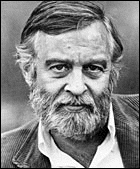A
Brief Introduction by Belinda
Webb who is
the author of A Clockwork Apple.
She lives in London.
The
author of seven novels and two collections of short stories Richard
Walden Yates was born on February 3 1926 in Yonkers, New York.
Richard,
or Dickie, shone bright upon the publication of his first novel,
Revolutionary Road,
which was nominated for the National Book Award in 1961.
It
drew unbridled praise and branded Yates an important new writer.
Kurt Vonnegut claimed that Revolutionary Road
was the Great Gatsby
of his time. William
Sytron described it as "A deft, ironic, beautiful novel that deserves
to be a classic." Tennessee
Williams went one further and said, "Here is more than fine writing;
here is what, added to fine writing, makes a book come immediately,
intensely, and brilliantly alive. If more is needed to make a
masterpiece in modern American fiction, I am sure I don't know what
it is."
Revolutionary
Road
was set in Connecticut in 1955.
Yet despite capturing a fifties world of happy domesticated
women, corporate innovation and possibility, Richard was intent on
illuminating the human misery of this decade and highlighting what he
saw as being the myth of the American Dream.
In
1962 Eleven Kinds of Loneliness
was published, his first collection of short stories.
It too had praise heaped upon it.
Kurt Vonnegut said it was "The best short-story collection
ever written by an American."
His
writing skills were further utilised when, upon returning from LA,
Richard began as a speechwriter for then Senator Robert F. Kennedy
until the assassination of JFK brought it to an end.
From there he moved onto Iowa where, as a creative writing
teacher, he would influence and inspire writers such as Andre Dubus
and Dewitt Henry.
His
third novel, Disturbing the Peace was
published in 1975. Perhaps
his second most well-known novel, The Easter Parade,
was published in 1976. The
story follows the lives of the Grimes sisters and ends in typical
Yatesian fashion, replicating the disappointed lives of
Revolutionary Road.
However
Richard began to find himself as a writer cut adrift in a sea fast
turning towards postmodernism yet would stay true to realism.
His heroes and influences remained the classics of F.
Scott-Fitzgerald, Flaubert and short-story master, Chekov.
It
was to his school and army days that Richard turned to for his next
novel, A Good School (1978)
which was quickly followed by his second collection of short stories,
Liars in Love (1979).
Young
Hearts Crying
emerged in 1984 followed two years later with Cold Spring
Harbour,
which would prove to be his final completed novel.
Richard
Yates died in the VA hospital in Birmingham, Alabama in November
1992.
Like
the fate of his hero, Flaubert, whose novel Madame Bovary influenced
Revolutionary Road
and The Easter Parade,
Richard Yates' works are enjoying a posthumous renaissance &endash;
attracting newly devoted fans across the Atlantic and beyond.
The
film of Revolutionary Road,
starring Leonardo di Caprio and Kate Winslet, and directed by Sam
Mendes, is due to appear in cinemas early in 2009.
Primary
Works
Revolutionary
Road. Boston: Little, Brown, 1961.
Eleven kinds of
loneliness; short stories. Westport, Conn: Greenwood, 1972,
1962.
Bridge at Remegen,
(screenplay) 1968.
A Special Providence.
NY: Knopf, 1969.
Disturbing the peace:
a novel. NY: Delacorte Press/S. Lawrence, 1975.
The Easter Parade,
NY: Delacorte Press/S. Lawrence, 1976.
A good school: a
novel. NY: Delacorte Press/S. Lawrence, 1978.
Liars in love:
stories. NY: Delacorte Press/S. Lawrence, 1981.
Young hearts
crying. NY: Delacorte Press/S. Lawrence, 1984.
Cold Spring
Harbor. NY: Delacorte Press/S. Lawrence, 1986.
The collected stories
of Richard Yates. NY: Henry Holt, 2001.
Selected
Bibliography 1980-Present
Bailey, Blake. A tragic
honesty: the life and work of Richard Yates. NY: Picador,
2003.
Baker, Charles R. "Richard
Yates 1926-1992." in Parini, Jay. ed. American Writers: A
Collection of Literary Biographies, Supplement XI: Toni Cade Bambara
to Richard Yates. NY: Scribner's, 2002.
Castronovo, David.
Richard Yates. NY: Twayne, 1996.
Klinkowitz, Jerome. The
New American Novel of Manners: The Fiction of Richard Yates, Dan
Wakefield, and Thomas McGuane. Athens: U of Georgia P,
1986.
Naparsteck, Martin.
Richard Yates Up Close: The Writer and His Works. Jefferson,
NC: McFarland, 2012.
MLA Style
Citation of this Web Page
Reuben, Paul P.
"Chapter 10: Richard Yates." PAL: Perspectives in American
Literature- A Research and Reference Guide.
URL: http://www.paulreuben.website/pal/chap10/yates.html
(provide page date or date of your login).
| Top
|

